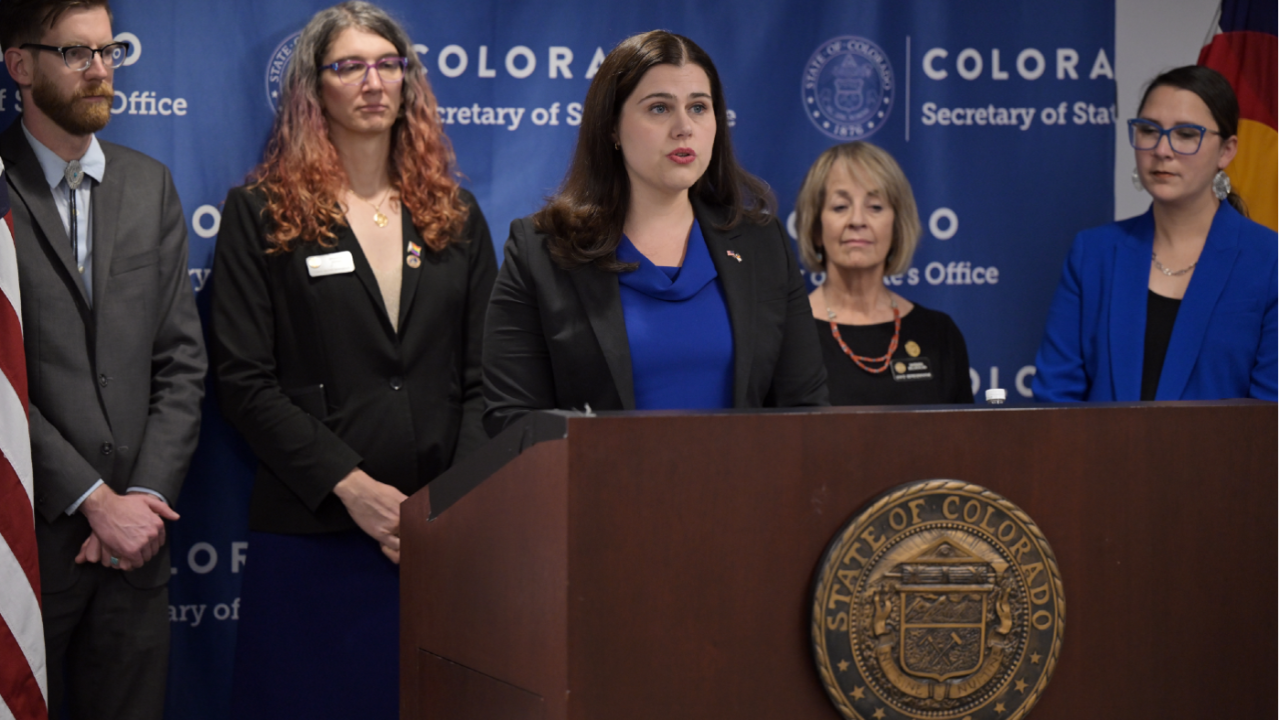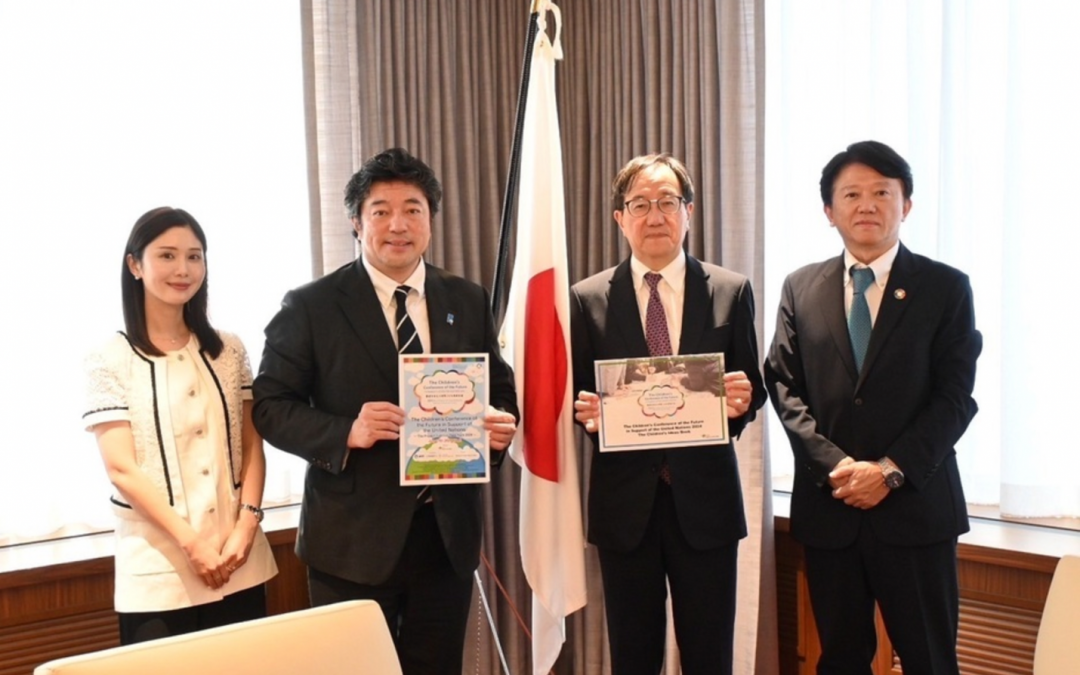
by Editor | Jul 22, 2024 | News
This article was originally published in Japanese on Tokyo Headline, and was translated to English using DeepL.
he Children’s Conference of the Future in Support of the United Nations ~The Project Launch Event in New York 2024~” will be held at the United Nations Headquarters DDR on July 17 (local time), the last day of the High Level Political Forum at the United Nations Headquarters in New York, USA. Conference of the Future in Support of the United Nations ~The Project Launch Event in New York 2024~” at the United Nations Headquarters DDR on July 17 (local time), Mr. Koji Ichiki, Representative Director of the Peace Communication Foundation, and Mr. Nakayama, former Vice Minister of Foreign Affairs and Mr. Yasuhide Nakayama, former Vice Minister of Foreign Affairs and Director for External Relations of the Foundation, visited Mr. Mikio Mori, Consul General and Ambassador of Japan in New York, at the Consulate General of Japan in New York on July 16, 2012.
During the visit, they discussed collaboration with the “Japan Parade,” which is held every May in New York to introduce and promote Japanese culture, including traditional culture such as taiko drumming and martial arts, as well as pop culture, in the year 2025.
On the same day, Ambassador Kazuyuki Yamazaki, Permanent Representative of Japan to the United Nations, visited the Permanent Mission of Japan to the United Nations in New York to thank the Permanent Mission of Japan for its cooperation in the “Global Children’s Future Conference in Support of the United Nations” ceremony and project events to be held at UN Headquarters on April 17, and to discuss the exchange between Alpha generation children including Japanese and children around the world. He also explained the exchange between children of the Alpha generation, including those from Japan, and those from around the world, the exchange of opinions on creating global experiences through UN Headquarters, and plans for 2025, and asked for their continued readiness for cooperation.


by Editor | Jul 7, 2024 | News
This week saw three notable elections occurring, all with varying levels of importance for the Four Pillars.
Labour has won the UK general election. Although not a formal member of the EU anymore (and Bre-enter does not seem to be a plausible policy as of now), a UK on the rebound is good for strengthening the Pillar of Europe (they are still a NATO member after all). Keir Starmer and the new cabinet is also continuing on the strong support for Ukraine since the invasion began. A reinvigorated UK from the lost decade would be a key in maintaining the rules-based order around the world.
Macron called the French parliamentary elections early, in a major gamble that could hand a gift to the far-right, which sought to disrupt cooperation and collaboration within the EU and also abroad (read: with regards to the Four Pillars). The first round forecasted that the gamble failed, but after the run-off, it seems that Macron was vindicated – RN and Marine Le Pen fell to third in the voting. This is good for continued cooperation of the Pillars, and further French and European support for Ukraine, as Macron recently has been a major advocate in regional and international security. The full implications of this outcome is still yet to crystalize though.
Iran now has a new president, replacing the now-deceased Ibrahim Raisi. A supposed reformer, it is to be seen if this is a real reformist turn, or faux platitudes by the state. Since the Green Movement in the country, voter turnout has been decreasing, a marker of illegitimacy of the authoritarian and theocratic state – the voice of the public is not represented in government. It is to be seen how this will affect relations between Iran and its allies and rivals – most likely not very impactful.
Article of the week – What NATO Means to the World [Foreign Affairs]

Minh Nguyen is the Chief Editor of the Boston Global Forum and a Shinzo Abe Initiative Fellow. She writes the Four Pillars column in the BGF Weekly newsletter.
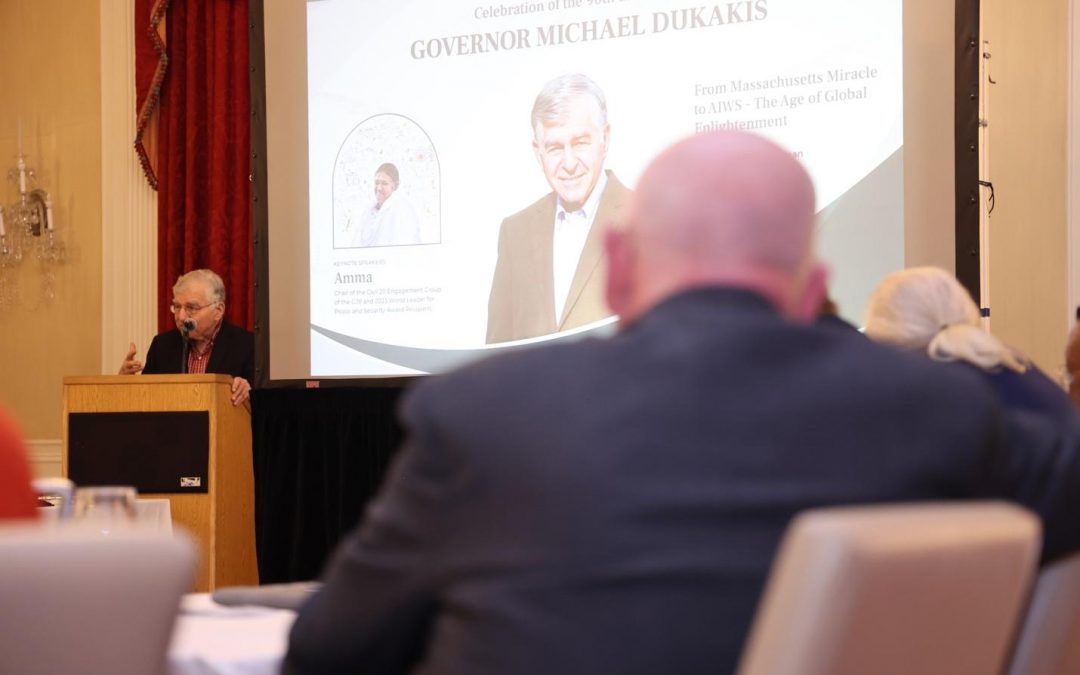
by Editor | Jul 7, 2024 | News
On July 4th, 2024, Governor Michael Dukakis, co-founder and Chair of the Boston Global Forum, and the BGF began a new initiative designed to inspire and guide the youth generation towards values of peace, security, compassion, and innovation. Named “Spiritual and Ethical Gifts,” this initiative seeks to encourage young people worldwide to contribute to a better and more humane society.
The inaugural gifts of this initiative are special e-cards featuring topics related to the AI World Society and its core principles. These e-cards will focus on AIWS’s commitment to fostering peace, enhancing security, nurturing compassion, and driving innovation. Each e-card will serve as a source of inspiration and education, encouraging recipients to embrace and practice these values in their daily lives and future endeavors.
This initiative reflects the BGF’s dedication to shaping futures through ethical AI development and fostering new models for democracy. By connecting with the youths, the BGF aims to not only plant technologically proficiency, but also humane and ethical values for the next generations.

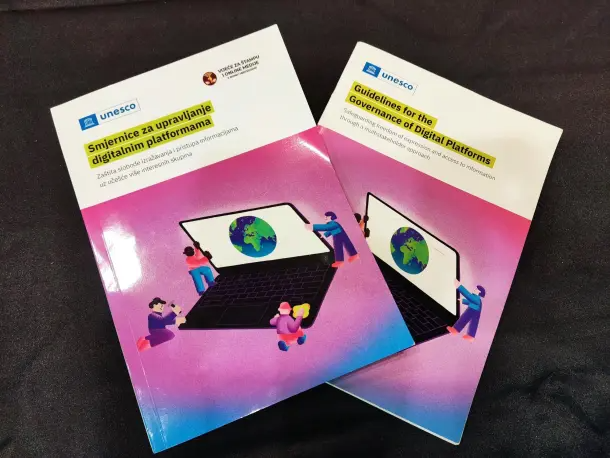
by Editor | Jul 7, 2024 | Global Alliance for Digital Governance
The full article on this UNESCO was published on its website.
As happens in different parts of the world, digital platforms in South-East Europe have certainly improved people’s access to information. However, they are also responsible for an increasing spread of harmful content, such as disinformation and hate speech, through human and automated systems. This threatens democracy, fuels conflict, hinders peacebuilding processes and undermines people’s right to access verified information, which is essential for quality public debate. These issues are particularly relevant in the Western Balkans, where the media sectors are deeply polarised and struggling for viability as concerns about media independence and integrity continue to undermine the credibility of journalism.
Within the “International Conference on the Digital Platform Governance: Building a Global Forum of Networks”, held in Dubrovnik on the occasion of the International Day for Countering Hate Speech (18 June), the Croatian Agency for Electronic Media (AEM) organised a roundtable titled “Digital platform governance through a multi-stakeholder and human rights based approach”. Supported by UNESCO, within the EU-funded project “Building Trust in Media in South-East Europe: Support to Journalism as a Public Good”, the roundtable brought together media regulatory authorities from UNESCO Member States including Albania, Bosnia and Herzegovina, Montenegro, North Macedonia and Serbia to exchange views on the governance of digital platforms, through a human-rights and multi-stakeholder based approach.
In his opening remarks, Tawfiq Jelassi, UNESCO Assistant Director-General for Communication and Information, noted referring to freedom of expression and access to information, that these fundamental rights are not just abstract ideals; they are vital tools in countering hate speech and empowering the communities targeted by it. “Independent regulatory authorities from South-East Europe play a key role in the governance of digital platforms, in line with human rights standards and through a multi-stakeholder approach,” he stated.

Maida Bahto Kestendžić/Press and Online Media Council BiH
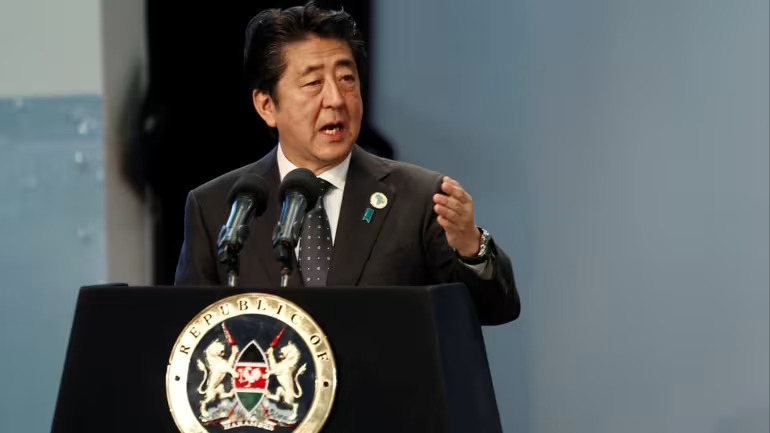
by Editor | Jul 7, 2024 | News
On July 8, 2022, the world was shocked and saddened by the tragic assassination of Japan’s former Prime Minister, Shinzo Abe. In the two years since this devastating event, the Boston Global Forum (BGF) has honored his legacy through the Shinzo Abe Initiative for Peace and Security. Launched on July 10, 2022, shortly after his untimely death, this initiative aims to advance global peace, security, and stability through collaborative efforts and innovative solutions.
The Shinzo Abe Initiative for Peace and Security was established to:
- Promote Global Peace: Foster dialogue and cooperation among nations to resolve conflicts and promote peace.
- Enhance Security: Develop strategies and frameworks to address global security challenges, including cyber threats and geopolitical tensions.
- Encourage Innovation: Support technological advancements that contribute to global stability and security.
Key Results and Impacts
In the two years since its inception, the Shinzo Abe Initiative has achieved significant milestones, including three Shinzo Abe Conferences held at Harvard University and in Tokyo in 2022, 2023, and 2024. These conferences produced Shinzo Abe Special Reports on Peace, Security, and new economic development strategies for Japan, emphasizing cooperation among the four pillars: the US, Japan, India, and the EU. Additionally, the initiative has focused on reinventing Silicon Valley for the Age of AI and the AI World Society.
On June 21, 2024, the Boston Global Forum, Shinzo Abe Initiative, and Wilson Center launched the Indo-Pacific Spark Initiative, fostering special economic and political relations between the US, Japan, India, and Vietnam. This effort continues Prime Minister Shinzo Abe’s visionary Indo-Pacific strategy with the support of partners like the Boston Global Forum and Wilson Center. With contributions from distinguished leaders and thinkers, the Indo-Pacific Spark Initiative aims to make significant strides in promoting peace, security, and development.
The Boston Global Forum remains dedicated to advancing the ideals and vision of Prime Minister Shinzo Abe, ensuring that his legacy continues to inspire efforts toward a more peaceful and secure world.

Shinzo Abe first talked of the concept of a free and open Indo-Pacific region at the 2016 Tokyo International Conference on African Development. © Reuters
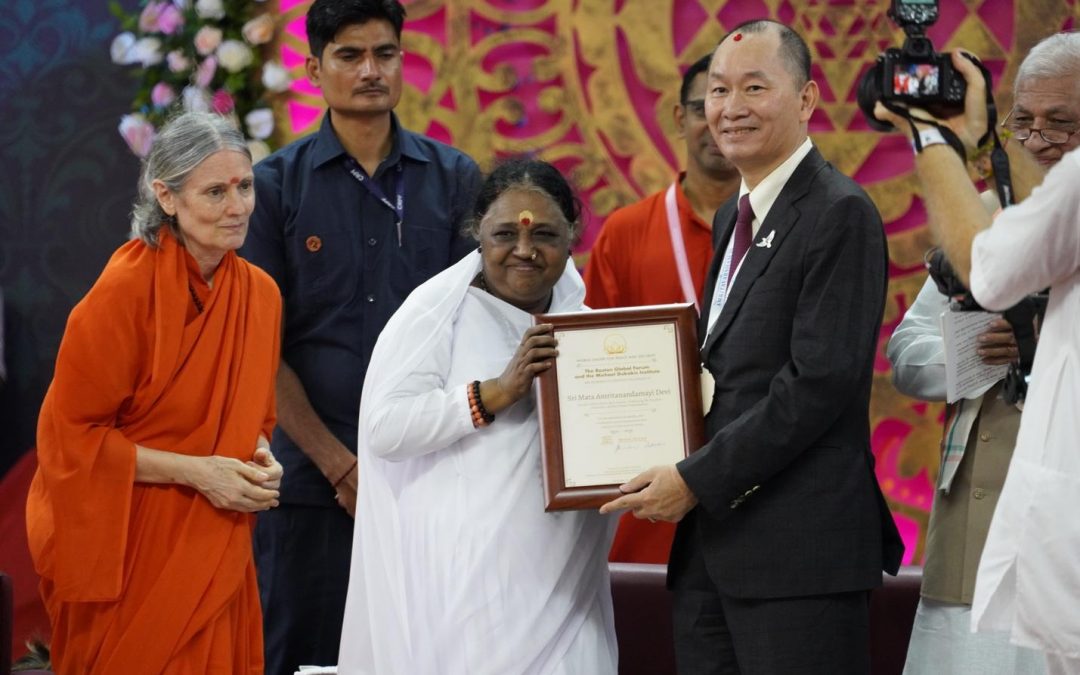
by Editor | Jul 7, 2024 | News
Amma will be visiting the United States from July 4 – August 11, in her first international tour since 2019. Amma will be conducting free public programmes in every city on her tour schedule. The programmes include a meditation guided by Amma, spiritual discourses by Amma and her disciples, bhajans (devotional singing) led by Amma in a call and response format, and the opportunity to meet Amma personally and receive her darshan (embrace).
Amma will also be holding spiritual retreats in a number of cities. The retreats offer a transformative opportunity to immerse oneself in Amma’s presence over three days, and include additional programs like a question-and-answer session with Amma, classes with Amma’s disciples and devotees on bhajans, meditation, yoga, and service opportunities.
https://amma.org/news/announcing-ammas-2024-us-tour/
https://us.amma.org/meeting-amma/ammas-north-america-tour
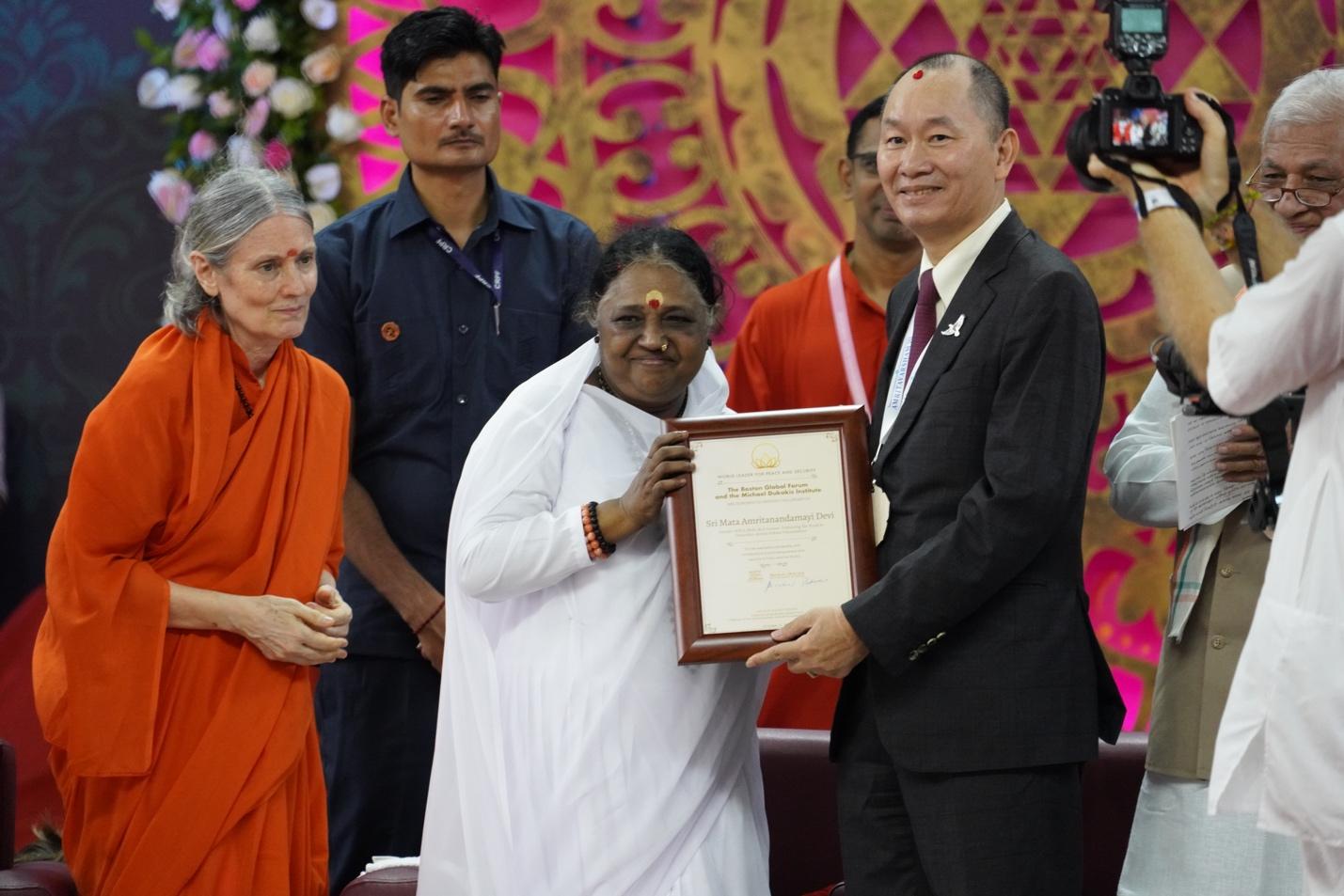
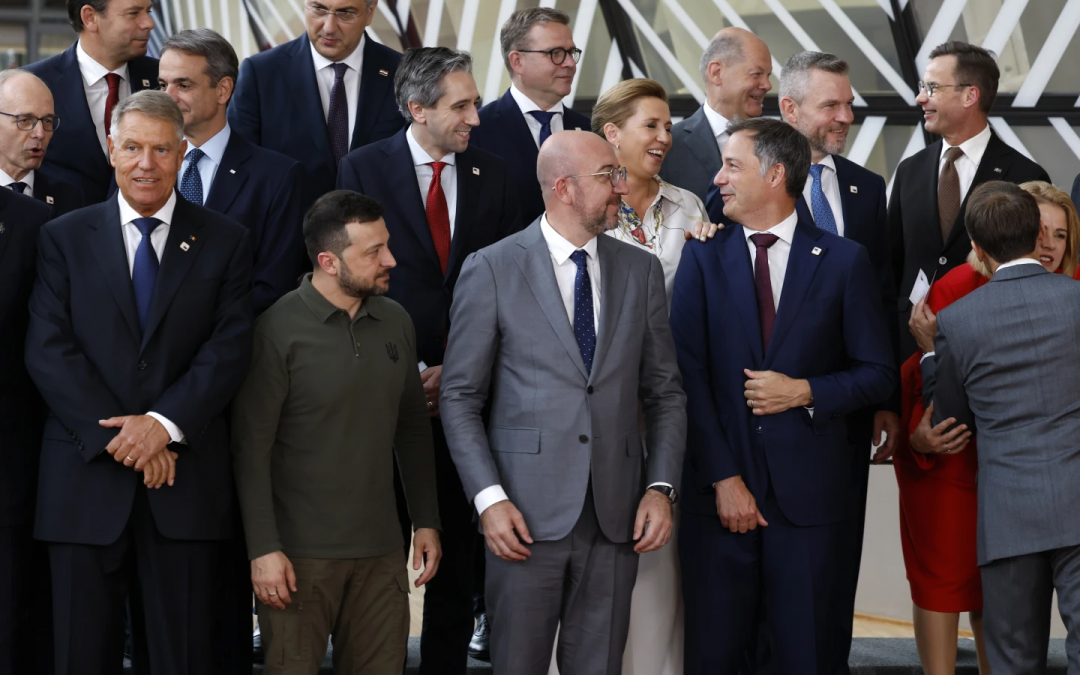
by Editor | Jul 1, 2024 | News
There were some “events” so to say that did happen this week… but we don’t cover electoral politics that aren’t end results, we will leave that to the analysts and experts in that field. Plus, there are still other Pillars to discuss.
The theme of US-India cooperation has been a recurring piecemeal theme in recent editions of Four Pillars, and it appears yet again this week. Rumor from the grapevines has it that the two Pillars are discussing cooperation on co-production of Javelin anti-tank missiles. In recent conflicts, this weapons system entered the popular consciousness through the Ukrainian Armed Forces’ usage of it against the Russian invasion. I will not waste too many words since we have analyzed these kind of cooperation in recent editions, but it is great to see continued work between these two Pillars, as the Indo-Pacific region continue to slowly boil into live conflict with rising tensions,
The EU, one of the Pillars, held a summit over the week after the European Parliamentary elections, partially to confirm the next batch of the bloc’s top bureaucrats and leaders, and also to convene the 27 member states to discuss ongoing issues within Europe and abroad, from defense to the bloc’s competitiveness. Ursula von der Leyen, BGF Peace and Security Award 2020 Recipient and the incumbent European Commissioner, secured her second term in the position, and will be joined by Estonian PM Kaja Kallas as EU Foreign Policy chief and former Portuguese PM Antonio Costa as European Council President. Also confirmed but separate from the EU appointments was Dutch PM Mark Rutte set to become the next NATO Secretary General, succeeding Jens Stoltenberg.
This EU gathering also marked the beginning of accession talks for Moldova and Ukraine, as announced by the EU earlier in the month. Ukraine signed security agreements with Poland and the EU, similar to the one Zelenskyy signed with the US at the G7 Summit. This is good in ensuring support for Ukraine in their struggle against not just Russia, but the alliance of Russia-China-North Korea, and thus a struggle against the backslide into global authoritarianism and an international state of nature.
Article of the week – America falters in fighting the information war [Axios]

(AP Photo / Geert Vanden Wijngaert)
Minh Nguyen is the Chief Editor of the Boston Global Forum and a Shinzo Abe Initiative Fellow. She writes the Four Pillars column in the BGF Weekly newsletter.
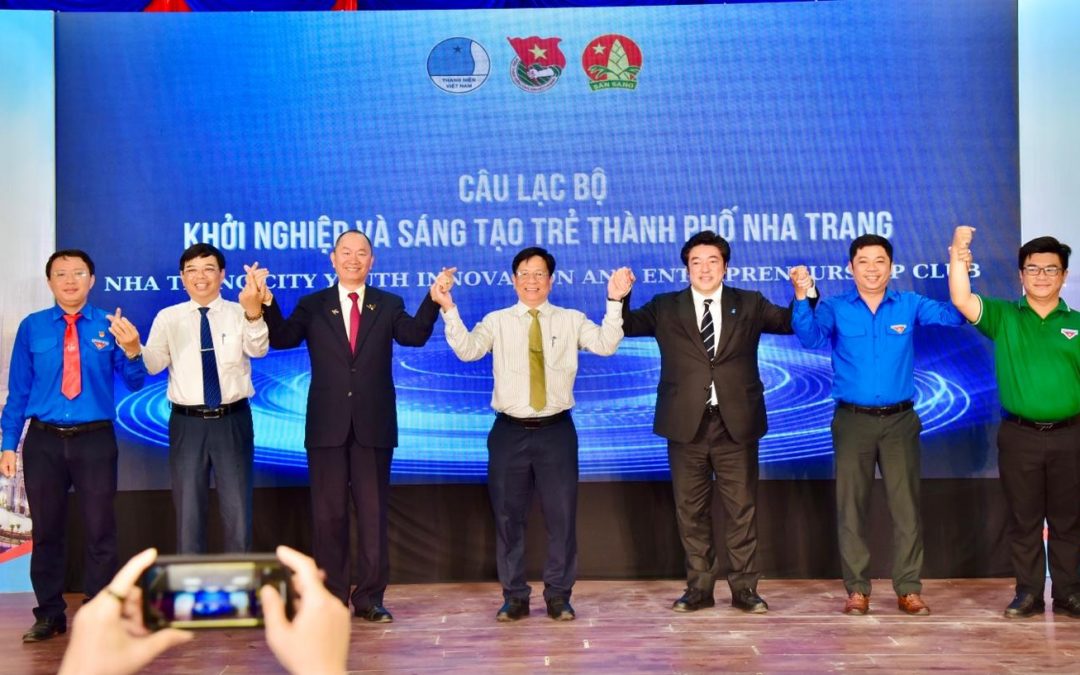
by Editor | Jul 1, 2024 | Event Updates, News
On June 26, the Nha Trang Government inaugurated the Youth Innovation and Entrepreneurship Club, marking a significant milestone for the city’s youth empowerment initiatives. The ceremony was graced by Mr. Ho Van Mung, Alternate Member of the Party Central Committee and Secretary of the Nha Trang City Party Committee, along with Mayor Nguyen Sy Khanh. Among the distinguished guests were Mr. Nguyen Anh Tuan, CEO of the Boston Global Forum, and Mr. Yasuhide Nakayama, Former Foreign State Minister of Japan and member of the Boston Global Forum’s Board of Executives. The Nha Trang City Youth Innovation and Entrepreneurship Club aims to harness scientific research and foster innovative startup activities through collaboration with individuals and organizations. Central to its mission is the cultivation of creativity, entrepreneurial spirit, and innovation among union members, teenagers, pupils, and students. The club seeks to operationalize the “Creative Youth” movement and support the “Accompanying Young People in Business Startups” program, facilitated by the Central Youth Union. It also aims to provide a platform for city youth and union members to converge, learn, exchange ideas, and foster entrepreneurial endeavors. During the launch event, union members and young participants engaged in lively discussions with invited delegates, focusing on startup ventures and innovation initiatives. International delegates from the Boston Global Forum shared insights and experiences, enriching the dialogue with their perspectives on global entrepreneurship trends. At the ceremony, Mr. Nguyen Anh Tuan, CEO of BGF, delivered an inspiring message to the people of Nha Trang, emphasizing that every citizen is an innovator. He presented a symbolic Boston-Nha Trang picture, a gift from Governor Michael Dukakis, Chair of BGF, to the government and people of Nha Trang City, symbolizing the strong ties and shared aspirations between the two cities. Looking ahead, the Boston Global Forum and AI World Society have pledged their support to nurture youth innovators within the club, facilitating access to AIWS ideas and connections within the Boston innovation community. This collaboration underscores a shared commitment to fostering innovation and empowering the next generation of leaders in Nha Trang City.
https://baokhanhhoa.vn/xa-hoi/202406/ra-mat-cau-lac-bo-khoi-nghiep-va-sang-tao-tre-thanh-pho-nha-trang-e310116/



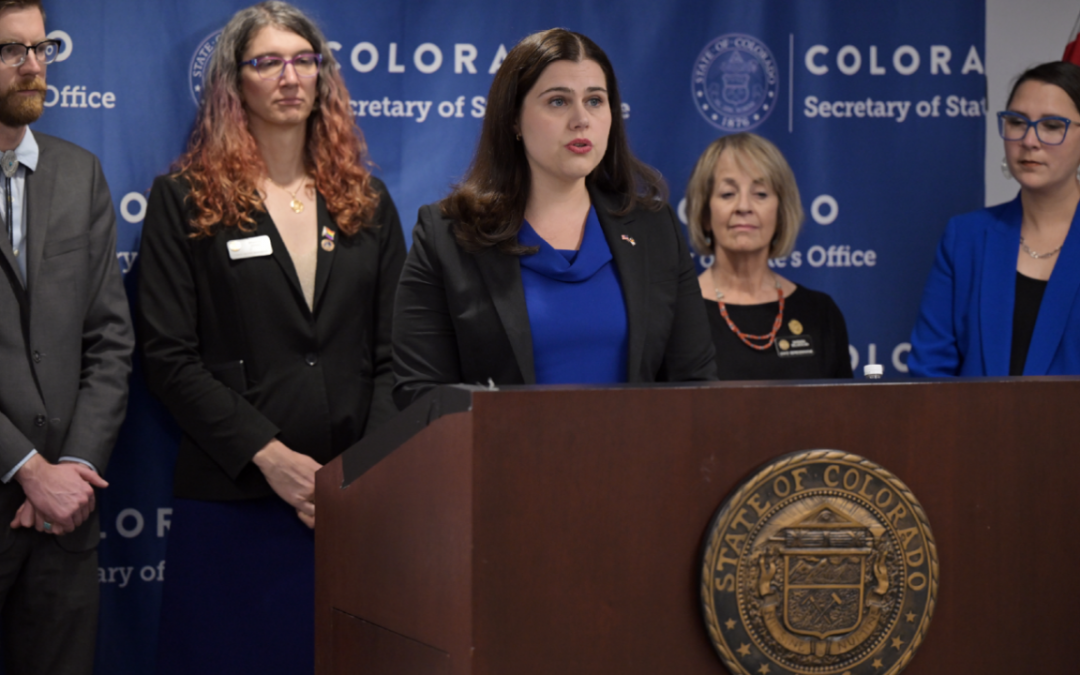
by Editor | Jul 1, 2024 | Global Alliance for Digital Governance
This article was originally published in The Hill.
There’s been a great deal of talk in Congress about regulating AI, but most of the legislative action is happening at the state level. If America is to lead the AI charge and create a stable environment for this tech to reach its enormous potential, Congress must think about something else: preemption.
Earlier this year, Tennessee passed the ELVIS Act to protect recording artists’ names, images and voices from AI-generated deepfakes. Colorado passed a law which will require businesses of all sizes in the state, as well as many AI model developers outside of the state, to conduct “algorithmic impact assessments” on racial, political, religious and other biases within their models.
But the most ambitious is California’s still-pending law, which would create a new administrative agency to oversee the development of the AI models themselves. Because the bill applies to any model “distributed” in California, and because any AI model generally available on the internet is distributed everywhere, this new agency would, in a practical sense, have jurisdiction over all AI models produced in the U.S.
Some who rightfully worry about the impact of AI on society might cheer on such forceful legislation, believing that the U.S. is “behind” the European Union in regulating it. But these people should think twice: AI regulation is not a race, and taking a few steps down the wrong regulatory path may leave us stuck there for a long time. It’s more important to regulate correctly than quickly.
Congress should therefore use preemption to put the brakes on misguided state attempts to regulate AI models.
Through preemption, the federal government reserves specific areas of lawmaking to itself. It already does this with many technologies, such as smartphones, because a patchwork of state laws for such products would create undue challenges in producing things we all rely upon.
While states should have a right to pass many AI laws — for example, policing AI-enabled deepfakes or fraud — the models themselves should be handled at the federal level, if they are regulated at all. Otherwise, the complexity of complying with as many as 50 model standards may deter investment in an important technology that China and other nations will fully exploit if we do not.
Congress has a few preemption options. It could simply restrict states from limiting the distribution of models on the internet. Many AI models are released as “open-weight,” meaning that the underlying numbers that define the model’s capabilities are freely available for download. Although it may sound crazy, this decades-old open-source model has produced trillions of dollars in economic value for the global economy.
Open-source undergirds the “permission-less” nature of software innovation. Because anyone can share ideas without permission from a regulator or other centralized body, innovation proceeds much faster and more flexibly. If Congress were to restrict states from impinging on this concept, many state-based model regulations — such as licensing regimes, agency preapprovals and similar approaches — would be preempted.
Another option would be to preempt state efforts to create novel liability regimes for AI.
California’s proposal, for example, assumes that any sufficiently damaging act enabled by an AI model — even if AI was only one tool among many — is the model developer’s responsibility, rather than the sole responsibility of the person who committed the act. This is the equivalent of holding Apple responsible for things people do with their MacBooks or iPhones.
Congress could create a much more reasonable nationwide liability standard: a rebuttable presumption that users rather than developers are responsible for misuse of AI models.
Finally, Congress could reserve the responsibility of setting technical standards to federal agencies such as the National Institute for Standards and Technology. NIST already houses the U.S. AI Safety Institute, which is dedicated to setting safety and evaluation standards for advanced AI models. No state could be expected to have similar technical expertise, so it would be logical for Congress to keep this duty with the federal government.
In all likelihood, the ideal preemption law would contain some combination of these three approaches. Some argue that bills like California’s are essential because Congress refuses to act. But the Senate’s bipartisan AI Roadmap rebuts this criticism. It explicitly downplays new regulatory regimes in favor of applying existing laws to specific applications of AI.
Furthermore, neither presidential candidate has made regulating AI models a campaign priority. Thus, it is reasonable to conclude that federal policymakers have deliberately chosen not to pursue model-based regulations for fear that they would harm American innovation.
AI presents many unanswered and profound questions. Answering them will take time. As that process plays out, Congress should not let one state decide our technological future.
